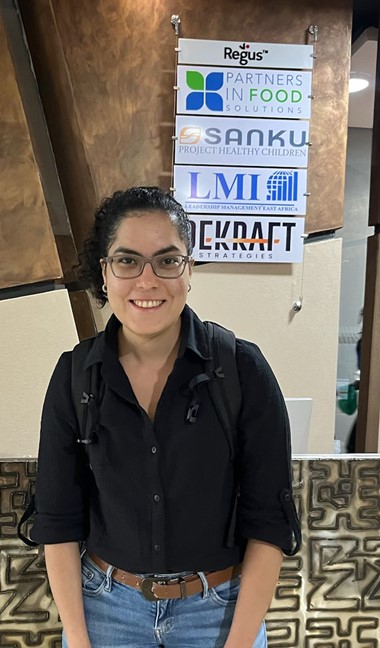Marilia Ramos, Kenya Internship (2023)

Reflections on Summer Internship
Thanks to the university’s Food and Nutrition Innovation Institute and the Seeding the Future Foundation, I had the ultimate chance to put the past year’s learning into action during this summer. This opportunity allowed me to work at the convergence of food entrepreneurship, innovation, business, finance, economic development, and social impact.
During the summer internship program, I collaborated with a fellow intern, where I, coming from a background in international trade and agribusiness, joined forces with a graduate student from the Friedman School of Nutrition Sciences and Policy, who specialized in food and nutrition. This highlighted the importance of cross-disciplinary creativity to enhance business, food and nutrition results. Our destination was Nairobi, where we aimed to assist Partners in Food Solutions (PFS), a US organization dedicated to enhancing business and social outcomes for nutrition-oriented food processors in Africa.
Our central assignments revolved around Tropical Lush, a beverage company in Nairobi affiliated with PFS. They stand out by offering a variety of natural fruit juices free from additives or concentrates. With a presence in Nairobi for over twenty years, some of the pressing hurdles they confront are: ineffective pricing methods, supply chain complications, short product shelf life, and difficulties in directly reaching consumers.
Together with my colleague, we undertook a pair of projects aimed at aiding Tropical Lush in tackling some of the difficulties mentioned above. Initially, we constructed a cost model that aids the company in calculating the per-liter production cost for each of their juice items. This, in turn, enables the formulation of a more streamlined pricing methodology. Our subsequent endeavor encompassed devising nutrient profiles for all the juices in their lineup, providing a foundation for implementing a marketing strategy centered around nutritional value.
Apart from our involvement with Tropical Lush, we also engaged with different food enterprises in Nairobi related to dairy, maize and nuts sectors. These interactions offered distinct insights into Kenya’s food system, enhancing our comprehension about the food business across the continent.
This internship neatly summarized so far my time at the Fletcher School: uncovering valuable insights and engaging in cross-cultural, multidisciplinary collaboration, which resonated with my educational path.

Did you know there are 147 “ecolabels” for food products alone? This number doesn’t even include the number of nutrition claims that are used. With so much consumer confusion and mistrust toward these labels, industry stakeholders have raised concerns about how to guide their labeling efforts. Based on interactions with the industry and the community, our team devised a survey to determine how customers view sustainability and nutrition when purchasing food products. By testing different packaging layouts and messaging techniques, we obtained qualitative and quantitative insights into what resonated most with consumers in terms of sustainable nutrition messaging. Our findings have identified specific strategies to communicate sustainability and nutrition through packaging, aiming to reduce confusion and increase consumer trust. We invite you to review our research and consider implementing our insights into your own company's labeling efforts.